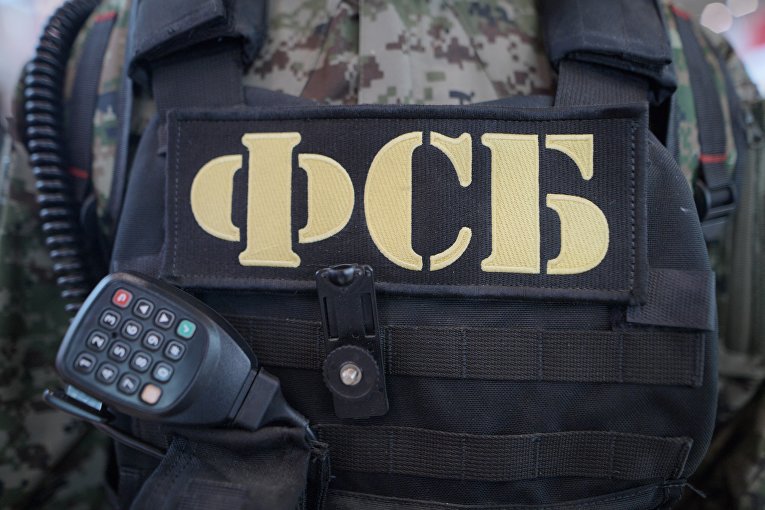MOSCOW, August 4 (RAPSI) - Two former officers of the Federal Security Service (FSB) indicted in fraud face trial in the Moscow Garrison Military Court, according to the court’s press service.
Earlier, reserve lieutenant colonel of the Federal Security Service Kirill Cherkalin, who had been convicted of fraud and bribe, testified against Dmitry Frolov and Andrey Vasilyev. One more defendant is a shareholder of the bank Creditimpex Georgy Shkurko.
A hearing on the merits begins on August 4. A prosecutor is to read indictment against the persons accused. The defendants are expected to enter the plea of guilty or not guilty.
In April, the Moscow Garrison Military Court sentenced reserve FSB lieutenant colonel Cherkalin to 7 years in high-security prison. The court found him guilty of receiving bribes on a large scale and large-scale fraud. In addition to the prison term he was also banned from holding law enforcement posts for 3 years, deprived of his colonel rank and second-class medal of the Order of Merit for the Motherland.
The case was heard under a special procedure, without examination of evidence and interrogation of witnesses, as the defendant had signed a plea deal with investigators. He has got 4 years less in prison than the prosecutor had asked for.
Civil claims of Sergey Glyadelkin and his cousin Igor Tkach who had been considered victims by the court in the fraud episode were granted partially and collected 318 million rubles ($4.4 million) in favor of each victim, that was in 60 times less than they had initially requested.
Meanwhile, Yury Spesivtsev, the defense lawyer for Frolov, draws attention to an unreliable forensic examination carried out on a fraud count due to what applications were filed with Russia’s Investigative Committee and Prosecutor General's Office seeking to verify the actions of experts and investigators, who had failed to submit corporate financial reports and bank loan documents on the Yurpromconsulting’s (YPC) outstanding loan in the amount of 1.9 billion rubles ($26 million) for a forensic study to assess the market value of 49 % of the share of the company YPC.
The attorney also states that the victims have no lawful legal connections on Yurpromconsulting. Tkach, who was recognized as victim in the case a year after the start of the probe along with his cousin Sergey Glyadelkin, can hardly be a victim due to his then official position. At the time of the alleged crime, he acted as the head of Mosnadzor, overseeing on behalf of the Moscow government an investment contract with Yurpromconsulting, the beneficiary of which he calls himself now, Spesivtsev noted.
The lawyer also points that Moscow’s government waived implementation of a project involving YPC in 2009-2010 after the liquidation of the city’s Department for Construction Investment Programs and task budget investment fund of Moscow and changes in land legislation. In late 2011, the law 427-FZ was adopted discharging Moscow’s authorities from liability for the annulment of all investment contracts envisaging construction in the city that resulted in the YPC bank loan default, Spesivtsev reminds.
Moreover, the defense lawyers have documents reading that the assets (units of the closed-end mutual Investment Property Fund named Fund of Investment properties ), that had been wrongly identified as belonging to Yurpromconsulting LLC as of December 2011, by the experts appointed by investigators and valued them at more than 2.5 billion rubles ($34 million) in fact was actually sold by the company in 2008, and all these circumstances completely exclude the presence of any criminal corpus delicti, Spesivtsev stresses.
According to the defense attorney, Glyadelkin “being a repeated victim” was directly related to a case against a former vice-mayor of Moscow Alexander Ryabinin convicted in 2012. His judgement contains the confirmation that the municipal project involving Yurpromconsulting was terminated in 2009, Spesivtsev says.
However, for some reason it is now said that someone allegedly threatened Glyadelkin with opening a case against him by Ryabinin. This is one more myth, Spesivtsev emphasises. Glyadelkin was an applicant in the case of Ryabinin, knew his rights very well, had state witness protection by the FSB and understood that he could bear no responsibility for participating in the case in this status. Moreover, a ruling on the refusal to initiate criminal proceedings against Glyadelkin upon an application filed by Ryabinin was issued in the summer of 2011.
The version about possible termination of the investment contract by Moscow in case of refusal to sell 49% share in the YPC in 2011 also looks ridiculous, because as result of the non-fulfillment of this contract by the City of Moscow, Yurpromconsulting itself applied to the Moscow Commercial Court with a claim for such termination at the end of 2010, the lawyer adds.



